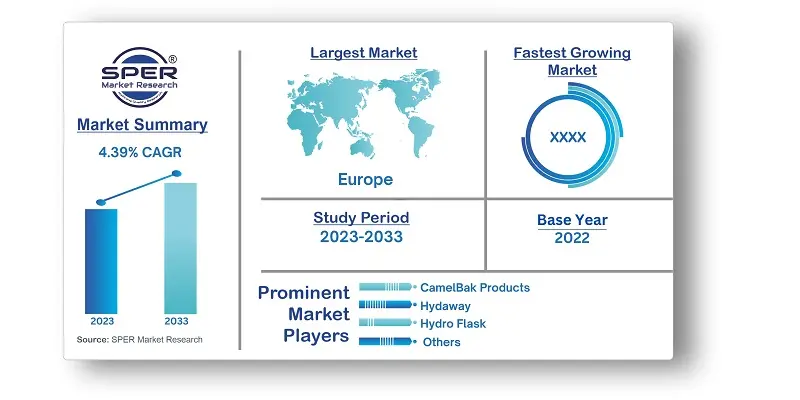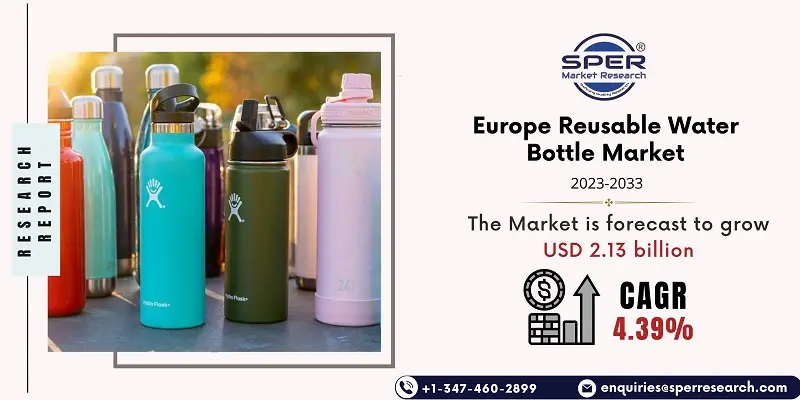
Europe Reusable Water Bottle Market Growth, Size, Trends, Share Revenue and Future Outlook
Europe Reusable Water Bottle Market Size- By Machinery, By Application Type, By Distribution Channel- Regional Outlook, Competitive Strategies and Segment Forecast to 2033
| Published: Feb-2024 | Report ID: FMCG2454 | Pages: 1 - 157 | Formats*: |
| Category : Consumer & Retail | |||


| Report Metric | Details |
| Market size available for years | 2020-2033 |
| Base year considered | 2023 |
| Forecast period | 2024-2033 |
| Segments covered | By Material, By Type, By Distribution Channel |
| Regions covered | Germany, Australia, Switzerland, France, Great Britain, Spain, Italy |
| Companies Covered | CamelBak Products, LLC; Contigo; Hydaway; Hydro Flask; Klean Kanteen; S’well; SIGG Switzerland AG; Tupperware Brands Corporation; Others. |
- Consumers
- Retailers and Distributors
- Manufacturers and Brands
- Environmental Organizations
- Government Bodies and Policymakers
- Corporate Entities and Institutions
- Tourism and Hospitality Industry
- Media and Influencers
| By Material: |
|
| By Type: |
|
| By Distribution Channel: |
|
- Europe Reusable Water Bottle Market Size (FY’2024-FY’2033)
- Overview of Europe Reusable Water Bottle Market
- Segmentation of Europe Reusable Water Bottle Market By Material (Glass, Aluminum, Plastic, Silicone, Steel, Copper, Brass, Others)
- Segmentation of Europe Reusable Water Bottle Market By Type (Insulated, Non-insulated)
- Segmentation of Europe Reusable Water Bottle Market By Distribution Channel (Wholesale, Supermarkets/Hypermarkets, Specialty Stores, Sport Stores, Local Stores)
- Expansion Analysis of Europe Reusable Water Bottle Market
- Problems and Obstacles in Europe Reusable Water Bottle Market
- Competitive Landscape in the Europe Reusable Water Bottle Market
- Impact of COVID-19 and Demonetization on Europe Reusable Water Bottle Market
- Details on Current Investment in Europe Reusable Water Bottle Market
- Competitive Analysis of Europe Reusable Water Bottle Market
- Prominent Players in the Europe Reusable Water Bottle Market
- SWOT Analysis of Europe Reusable Water Bottle Market
- Europe Reusable Water Bottle Market Future Outlook and Projections (FY’2024-FY’2033)
- Recommendations from Analyst
1.1. Scope of the report1.2. Market segment analysis
2.1. Research data source2.1.1. Secondary Data2.1.2. Primary Data2.1.3. SPER’s internal database2.1.4. Premium insight from KOL’s2.2. Market size estimation2.2.1. Top-down and Bottom-up approach2.3. Data triangulation
4.1. Driver, Restraint, Opportunity and Challenges analysis4.1.1. Drivers4.1.2. Restraints4.1.3. Opportunities4.1.4. Challenges4.2. COVID-19 Impacts of the Europe Reusable Water Bottle Market
5.1. SWOT Analysis5.1.1. Strengths5.1.2. Weaknesses5.1.3. Opportunities5.1.4. Threats5.2. PESTEL Analysis5.2.1. Political Landscape5.2.2. Economic Landscape5.2.3. Social Landscape5.2.4. Technological Landscape5.2.5. Environmental Landscape5.2.6. Legal Landscape5.3. PORTER’s Five Forces5.3.1. Bargaining power of suppliers5.3.2. Bargaining power of buyers5.3.3. Threat of Substitute5.3.4. Threat of new entrant5.3.5. Competitive rivalry5.4. Heat Map Analysis
6.1. Europe Reusable Water Bottle Market Manufacturing Base Distribution, Sales Area, Product Type6.2. Mergers & Acquisitions, Partnerships, Product Launch, and Collaboration in Europe Reusable Water Bottle Market
7.1. Europe Reusable Water Bottle Market Value Share and Forecast, By Material, 2024-20337.2. Glass7.3. Aluminum7.4. Plastic7.5. Silicone7.6. Steel7.7. Copper7.8. Brass7.9. Others
8.1. Europe Reusable Water Bottle Market Value Share and Forecast, By Type, 2024-20338.2. Insulated8.3. Non-insulated
9.1. Europe Reusable Water Bottle Market Value Share and Forecast, By Distribution Channel, 2024-20339.2. Online9.3. Offline9.3.1. Wholesale9.3.2. Supermarkets/Hypermarkets9.3.3. Specialty Stores9.3.4. Sport Stores9.3.5. Local Stores
10.1. Europe Reusable Water Bottle Market Size and Market Share
11.1. Europe Reusable Water Bottle Market Size and Market Share By Material (2020-2026)11.2. Europe Reusable Water Bottle Market Size and Market Share By Material (2027-2033)
12.1. Europe Reusable Water Bottle Market Size and Market Share By Type (2020-2026)12.2. Europe Reusable Water Bottle Market Size and Market Share By Type (2027-2033)
13.1. Europe Reusable Water Bottle Market Size and Market Share By Distribution Channel (2020-2026)13.2. Europe Reusable Water Bottle Market Size and Market Share By Distribution Channel (2027-2033)
14.1. Europe Reusable Water Bottle Market Size and Market Share By Region (2020-2026)14.2. Europe Reusable Water Bottle Market Size and Market Share By Region (2027-2033)14.3. Germany14.4. Australia14.5. Switzerland14.6. France14.7. Great Britain14.8. Spain14.9. Italy
15.1. CamelBak Products, LLC;15.1.1. Company details15.1.2. Financial outlook15.1.3. Product summary15.1.4. Recent developments15.2. Contigo15.2.1. Company details15.2.2. Financial outlook15.2.3. Product summary15.2.4. Recent developments15.3. Hydaway15.3.1. Company details15.3.2. Financial outlook15.3.3. Product summary15.3.4. Recent developments15.4. Hydro Flask15.4.1. Company details15.4.2. Financial outlook15.4.3. Product summary15.4.4. Recent developments15.5. Klean Kanteen15.5.1. Company details15.5.2. Financial outlook15.5.3. Product summary15.5.4. Recent developments15.6. S’well15.6.1. Company details15.6.2. Financial outlook15.6.3. Product summary15.6.4. Recent developments15.7. SIGG Switzerland AG15.7.1. Company details15.7.2. Financial outlook15.7.3. Product summary15.7.4. Recent developments15.8. Tupperware Brands Corporation15.8.1. Company details15.8.2. Financial outlook15.8.3. Product summary15.8.4. Recent developments15.9. Others
SPER Market Research’s methodology uses great emphasis on primary research to ensure that the market intelligence insights are up to date, reliable and accurate. Primary interviews are done with players involved in each phase of a supply chain to analyze the market forecasting. The secondary research method is used to help you fully understand how the future markets and the spending patterns look likes.
The report is based on in-depth qualitative and quantitative analysis of the Product Market. The quantitative analysis involves the application of various projection and sampling techniques. The qualitative analysis involves primary interviews, surveys, and vendor briefings. The data gathered as a result of these processes are validated through experts opinion. Our research methodology entails an ideal mixture of primary and secondary initiatives.



Frequently Asked Questions About This Report
PLACE AN ORDER
Year End Discount
Sample Report
Pre-Purchase Inquiry
NEED CUSTOMIZATION?
Request CustomizationCALL OR EMAIL US
100% Secure Payment






Related Reports
Our Global Clients
Our data-driven insights have influenced the strategy of 200+ reputed companies across the globe.




















